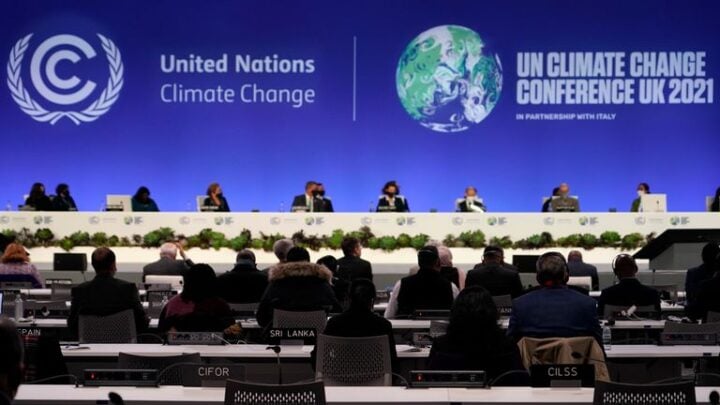“Pretend all you want like you are innocent, we all know the truth” – Kyle
“The great enemy of clear language is insincerity. When there is a gap between one’s real and one’s declared aims, one turns, as it were, instinctively to long words and exhausted idioms, like a cuttlefish squirting out ink” – George Orwell
In this column, we opened a discussion on September 13 on the future of gas and the implications of climate change activists pushing for defunding of fossil fuel projects as quickly as possible. That discussion led to a contribution by a subject matter expert who argued that the rhetorics of climate change advocates was unlikely to affect the future of gas in the short term. As we were on that matter, an unexpected global energy crisis broke out, leading to a general spike in the price of gas. Since then, gas prices have continued to soar, with Russia being the primary and dominant beneficiary. The development led us to pen yet another article, titled ‘The Future of Gas is Already Here’ published on October 11, 2021.
Our main purpose for these interventions was to prepare the minds of our policymakers and those billed to attend the recently concluded 26th edition of the global climate change gathering also known as Conference of Parties (COP 26) in Glasgow, to make a strong case for oil and gas-rich countries to have a transitioning program that makes sense and gives enough time for us to exploit our gas optimally before hurrying to ban funding for fossil fuel projects. Locally, we also wanted to point the attention of policymakers to the fact that with the way the progenitors and controllers of international finance were going, it would be difficult to rely on them like we had done before, to continue to fund oil and gas projects in the country. In this case, we recommended that it was time for local financing to be mobilised to the rescue.
Advertisement
For the records, it is important to state that this column is not against the campaign for net-zero carbon emissions. On the contrary, we believe that with global warming, the depletion of the ozone layer and deforestation, the world has no choice but to go in the direction of renewables. The only place we seem not to agree is the timetable to achieve the target. Our position is simply because we believe there are low hanging fruits to moving in the direction of net-zero emissions that need to be explored before the aggressive phase-out plan for fossil fuels. We are glad that the outcome of COP 26 supports our position. We shall return to this shortly. We had also canvassed the argument that the alternatives don’t seem to have been perfected to efficiently replace fossil fuels. For instance, many solar and wind-powered turbines have gas-fired backups which come to bear under frequent inclement weather. The next is the issue of justice or lack thereof. Our column demonstrated that the contribution of Africa to emissions was insignificant, relative to the rest of the world, but the impact of defunding fossil fuel projects would almost be fatal to developing countries whose economies are dependent on it, at least in the short to medium term. Closely related to this is that the developed global north which is responsible for over 90% of carbon emissions has ridden on the back of coal and fossil fuel to develop and industrialise their economies. They should also feel obliged to bear the humongous cost of transitioning, if not wholly, at least partially.
Concern for climate change and the campaign have been on for a long time. Under the auspices of the United Nations, the Conference of Parties was set up 27 years ago and the annual meetings rotate from one location to another, except for last year when it did not hold, in deference to Covid-19 lockdown. The purpose of the climate action is to limit the global average temperature rise this century to 1.5degrees Celsius. It has been estimated that temperatures have increased in the last 100 years by one degree celsius. To achieve that there was an understanding that the world should target to reduce the use of fossil fuel by at least 50%. To fast track this objective, multilateral organisations and international banks started a campaign to stop funding fossil fuel projects. European Investment Bank, the largest bank in Europe, says it will not fund any new oil and gas projects by the end of this year. Just last month, JP Morgan Chase joined 40 other financial services leaders in a group formed in April this year, Net-Zero Banking Alliance. Other global banks in this group include Morgan Stanley, Citi Group and UBS. Besides the 2050 deadline to achieve net-zero emissions, a major part of the mandate of this group is to freeze funding for new fossil fuel projects as soon as possible. So, our intervention to sensitise Nigeria and the rest of Africa on alternative funding plans for their gas projects was not misplaced. It even became more imperative when viewed from the angle that oil and gas accounted for over 8% of Nigeria’s GDP of circa $440 billion and 90% of her foreign exchange earnings as of 2020. Meanwhile, the country still has some 207 trillion Standard Cubic feet of gas reserves in the ground waiting to be produced. There is ample demand both locally and internationally for the gas when produced.
As countries proceeded for the two-week conference in Glasgow, there was understandable concern that COP 26 may produce a few bombshells that would unravel some of the economies of poor nations. However, what came out of Glasgow was not terrible news after all. Thanks to India which committed to a net-zero target of 2070, coal was saved a strong bashing. India was not alone as China, US and Australia refused to sign along with countries that agreed to phase out coal. Because of this pressure, the term, ‘phase-down’ was introduced to the agreement as against ‘phase out’. Also, to be phased down are subsidies for fossil fuels and not necessarily funding, even if on paper only. Before then, it is instructive to highlight that the fundamental target about global warming to reduce temperature rise to 1.5 degrees Celsius didn’t seem to see the light of the day as announcements made at the conference by major countries tend to point to temperature rises in the neighbourhood of about 2.5 degrees celsius.
Advertisement
Just like had been argued before, the biggest culprits in emissions are not the developing countries, even though many of them have suffered the effects more. There are studies that have identified the US, China and Russia as having contributed the highest to global emissions and therefore should take responsibility and actually pay for “loss and damage” suffered by vulnerable countries. In the pact, developed countries would increase funding to around $40 billion by 2025 to help poor countries adapt to the effects of climate change. It would be recalled that the Paris Agreement provided for $100 billion annually to support developing countries in their climate action. In Copenhagen in 2009, advanced countries pledged to support poor countries with $1 trillion under the “Climate Mitigation and Adaptation Finance” to ease energy transitioning. The implementation has been very poor, 12 years after. Based on this experience, some developing countries didn’t seem to make heavy weather of the additional pledges that were made in Glasgow. It is also why countries didn’t seem to be bullish with commitments on climate action. Heavy expenses are also a major threat to energy transitioning. The United Nations Environmental Program (UNEP) estimates that developing countries would need to spend anywhere between $140 billion and $300 billion per year by 2030 which will increase to between $280 billion and $500 billion annually by 2050.
Some other agreements reached included that leaders from 120 countries representing about 90% of the world’s forest pledged to halt and reverse deforestation by 2030. Over 100 countries led by the US and EU pledged to extinguish emissions from Methane by 2030. Despite the push back from India and China, more than 40 countries including major coal users like Poland and Chile agreed to move away from coal. Coal is understood to constitute the largest carbon footprint in the energy mix. Unfortunately, the US depends on coal to the extent that close to 20% of its energy mix comes from coal. Coal also accounts for 65% of the energy mix for China. The same coal accounts for about 57% of energy production in India. Even Russia with its gas power has 15% of its energy mix being accounted for by coal. As of last year, 54% of Australia’s energy mix was accounted for by coal while oil and gas accounted for 22%. Any wonder why these countries would not make any serious commitment about the phasing out of coal? Those who live in glass houses do not throw stones, even in Glasgow.
My suspicion is that since these countries could not reach an agreement on coal because of enlightened self-interest, the discussion of fossil fuel, even though was mentioned in passing could not be entertained as a major issue. But should countries like Nigeria go to sleep? Absolutely No. There is COP 27 coming up in Egypt in a year’s time. So, the time bought could be used to do a lot. Granted that in his speech at the Conference, President Buhari committed that the country would be able to achieve net-zero emissions by 2060, he also added that the country will require some $400 billion to achieve the target. There is a need to strategically and aggressively initiate deals quickly to expand production in our fossil fuel projects. We had suggested how to fund this in previous columns and that holds truer even at this moment that there is a little respite. As oil and gas projects are being initiated, we should not forget that the fertilizer industry which our agricultural sector depends on should be aggressively pursued.
Just last week, the Organisation of Petroleum Exporting Countries (OPEC) made a profound statement that oil and gas would continue to dominate the global energy mix until 2045. According to OPEC, fossil fuels consisted 30% of the global mix in 2020 and would increase to 31% by 2025 and tapper down to 28% by 2045. It went further to predict that the industry would require a cumulative investment of $11.8 trillion by 2045. In encouraging long term investments in oil and gas, the secretary-general of OPEC Muhammad Barkindo emphatically stated “any talk of oil and gas industries being consigned to the past and of the need to halt new investments in oil and gas is wrong-headed”
Advertisement
As we do these, should we ignore renewable energy? Again, the answer is No. Ultimately that is the way of the future. The time we have bought now should be used to study and come up with areas where the country can fit in the value chain. We should challenge our egg heads and knowledgeable experts to go to the laboratories and come up with our own version of renewables. Nigeria should aim to be part of the technology, the skills and the component parts in renewables. The adoption of renewables has also led to a spike in demand for some minerals found in Nigeria. Copper, nickel, and lithium are reported to exist in Nigeria in commercial quantities. Cobalt is probably the only mineral that is not found in Nigeria but exists in the Democratic Republic of Congo, in fact, 70% of the global deposit is found there while Zambia also holds some commercial quantities. There is also the concern that the increase in mining activities for these minerals could lead to another environmental issue. Mining is not only environmentally unfriendly, but contaminants can spill over from project sites into the groundwater, leading to pollution. Some of these minerals are also recyclable. It must be noted that green energy projects have the advantage of benefitting from green bonds and at the moment, 4 of such bonds have been issued in the country to raise some $130m.
We are therefore challenging the country to join the renewable energy race early enough and be proactive in our research and development. New areas like hydrogen as an energy source should be explored by our scientists. We should avoid our experience in oil and gas where we began to cry wolf years after the sector had been dominated by foreign technology, capital and labour. Our local content should be created now.
Views expressed by contributors are strictly personal and not of TheCable.
Add a comment







